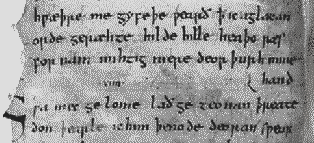Summary and Analysis
 |
This section, perhaps intended to be full of joy and celebration, turns out to be not completely jubilant. Grendel, after being wounded by Beowulf and "doomed to die"(Norton, 38), hides in a lake.
Warriors, from many kingdoms, gather near the lake to witness the "wonder, the footprints of the foe"(Norton, 38). They see that the water in the lake is "boiling with [Grendel's] blood, the horrid surge of waves swirling, all mixed with hot gore, sword-blood"(Norton, 38). The scop makes an effort to emphasize the happiness of
the people and their rejoice at the Beowulf's success in
battle.
|
The warriors, fascinated by this astonishing sight, return to their kingdoms carrying a new tale about Beowulf's victory over Grendel.
In the next paragraph, the text gives us a tale, told by one the thanes, about Sigemund who kills a dragon. Then, we hear a story of the unsuccessful king Heremod who betrays his people by being cruel and avaricious (Norton, 38). Perhaps, the purpose of both tales is to show some of the similar tales that were often remembered and told by the thanes. Likewise, these tales might indicate that none of the great stories is ever forgotten.
"Many a stout-hearted warriors"(Norton, 39) go back to the mead-hall to celebrate Beowulf's victory over Grendel. Warriors are drinking mead and listening to the pleasant sound of a harp. In the midst of all this celebration, Hrothgar comes forward and gives speech describing his gratefulness to Beowulf. The King praises the "God of Old"(Norton, 39) for being kind to a woman who gave birth to Beowulf. He says that the God works through Beowulf to help him accomplish "the deed [s] that all of [them] with [their] skill could not perform"(Norton, 39). Hrothgar's speech underlines "Christian vs. Pagan" theme of this poem. The "ring-giver"
(Norton, 39) also says that, in his heart, he will love Beowulf as a son (39). Beowulf replies to Hrothgar's speech saying that, indeed, the Lord has played a role in his success. Also, he describes the battle between himself and Grendel.
As we read along, we are given a detailed description of Grendel's hand ripped off by Beowulf. Grendel 's nails are described as being "monstrous" with nails "like steel"(Norton , 39). People are astonished and can't believe that Beowulf has beaten the monster: "…many a wondrous sight for each man who looks on such things"(Norton, 39).
In the next paragraph, the text gives us the description of the Hrothgar's gifts to Beowulf and his warriors. Beowulf gets golden standard, "a decorated battle-banner -- a helmet and mail-shirt," and eight horses with "golden bridles" (Norton, 40). This ceremony shows the reader how generous the lord is when it comes to rewarding warriors for their heroic actions.
There is music and songs, and scops tell more stories. Surprisingly, the next story is not so happy. We are given a description of an unfortunate woman whose "son and brother, wounded by spears fell to their fate"(Norton , 41). As the story unfolds, we see more bloodshed and violence. Warriors are killed after quarrels and revenge is sworn, as if foretelling something bad might happen in the future. Consequently, this story contributes to both themes of this poem: "Men vs. Evil" and the " Foretelling of Doomed Future." Also, the story of Hildeburthprovides us with a very detailed description of a Pagan burial ceremony with funeral fires: "Heads melted as blood spang out..."(Norton, 41).
[ -next- ]
